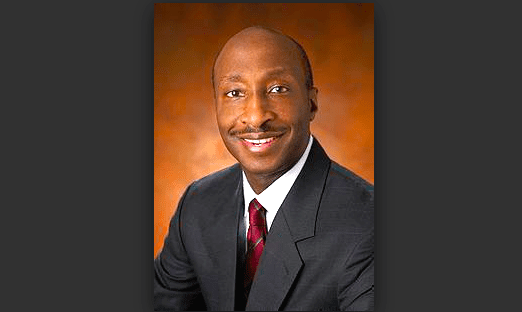
It’s no secret that the Trump administration is familiar with receiving resignation letters in their inbox. Merck Pharmaceutical CEO Kenneth Frazier recently stepped down from the Trump manufacturing advisory council, following the president’s lack of public damnation against the domestic and racial terrorist attack in Charlottesville, Virginia this past weekend.
In a statement on Twitter, Frazier said,“America’s leaders must honor our fundamental values by clearly rejecting expressions of hatred, bigotry and group supremacy, which run counter to the American ideal that all people are created equal.” He continued, “As C.E.O. of Merck and as a matter of personal conscience, I feel a responsibility to take a stand against extremism.”
Soon after Frazier’s resignation, Intel CEO Brian Krzanich, Under Armour CEO Kevin Plank, and Campbell Soup Company CEO Denise Morrison, followed in Frazier’s steps and stepped down from their positions on the council. Others have since also departed,
Frazier’s move has been viewed as favorable and inspiring to many Americans. Check out these five reasons a millennial navigating the Trump era must know Ken Frazier.
He is a minority in a White-saturated position
As the sitting CEO of Merck & Co., Frazier is one of only four black CEOs of Fortune 500 Companies. As the first African American to lead a major pharmaceutical company, Frazier faces more pressure than the typical CEO. Going beyond those pressures and standing up against injustice has set a positive precedent for many future Black CEOs.
He had humble beginnings
Born in 1954, Frazier grew up in north Philadelphia and was raised by his father, who was a janitor. Frazier’s life was struck with tragedy when he lost his mother at the age of 12 but that didn’t stop his father from pushing Frazier and his siblings to succeed at whatever they did. After graduating high school at the age of 16, Frazier attended Pennsylvania State University. After earning his B.A. at Penn State, Frazier attended Harvard University for law school.
He went from attorney to CEO
In 1978, Frazier graduated from Harvard and began practicing law in his hometown of Philadelphia with Drinker Biddle & Reath. During his tenure at Drinker, Merck was his client. In 1992, Frazier became general counsel in Merck’s public affairs division and was later named senior general counsel. As counsel at Merck, Frazier diligently and successfully fought against claims that the company’s drug, Vioxx, caused heart attacks and strokes. In 2006, he was named executive vice president, in addition to general counsel. The following year, he was named the president of the company. In 2011, he became the CEO and a board member of the company.
His track record shows he’s a crusader for justice
Frazier’s stance against Trump isn’t his first occurrence fighting against racial injustices. In 1991, Frazier was asked to represent death row inmate James Willie Cochran, a Black man who had been accused of murdering an assistant manager at a Birmingham, Alabama grocery store in 1976. Frazier believed race played a key role in Cochran’s sentencing. Frazier worked tirelessly, and in 1995, Cochran’s conviction was overturned.
His moral compass can’t be deterred, regardless of the circumstances
History has shown that pharmaceutical companies and the presidential administrations often work together. Frazier’s decisions to step away from the president’s favor is historical because it shows that justice is more important than business. With his decisions, Frazier became the first pharma CEO to take a stance against Trump. At first, there was silence from the pharmaceutical industry but his decision was later met by praise. It’s unclear how this resignation will directly affect Merck, but it is clear the company will not stand for blatant racism, bigotry, and injustices.













